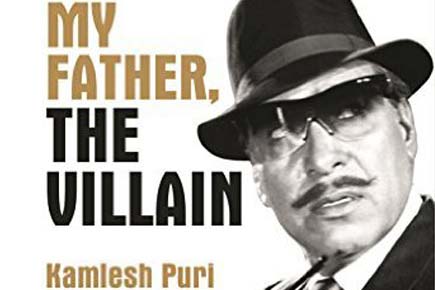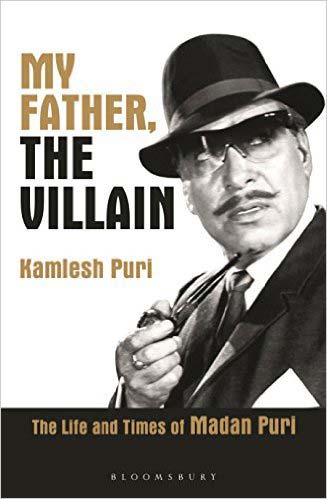A selection of extracts from Kamlesh Puri's book on veteran Bollywood actor Madan Puri titled, 'My Father, the Villain'

Friends and Neighbours in Punjabi Galli
Movies used to be made around the clock, though producers preferred to shoot by night. As sound was recorded by sync sound, external noise was much less at night. The crowd of film fans was also less. After a couple of months of living in the Panditjee's house as subtenants, Saigal uncle kindly gave us a two-bedroom flat on rent in his own building Radha Kunj (now called Amar Kunj) in Punjabi Galli. Saigal uncle’s mother and my grandfather were cousins.

ADVERTISEMENT
K L Saigal was an affectionate and kindly man. Every evening he screened his movies on the terrace of the building for family and friends. The men would enjoy their drinks while the ladies sat and chatted and the kids ran around. It was not uncommon to see Bal Thackeray, then a cartoonist, at the Saigal house. Lata Mangeshkar was also a regular visitor. Saigal uncle had two daughters, Neena and Beena; his eldest child, Madan Mohan (Gogi) had a wonderful voice, but died before he could fulfil his potential.
At the time of our move to Punjabi Galli the entire Kapoor family stayed in the Lane: Prithviraj Kapoor with his sons, Raj, Shammi, Shashi and their sister Umi; Prithviraj’s father Lala Bisheshwar Nath Kapoor and Prithviraj’s two sisters Kailash and Shanta. Bauji worked with Raj, Shammi, Shashi and their cousin Subiraj, then with the next generation, Randhir and Rishi, and also their wives Babita and Neetu.
Prithvi Theatres, established in Bombay in 1944 by Prithvi Raj Kapoor, heralded the renaissance of the Hindustani Theatre Movement in India. He was large hearted and a great man indeed.
He usually had hordes of young actors staying with him and with his father. One would always see Papaji’s brothers Ram, Amar and Vishi, his sons Shammi and Shashi and his nephews Tiger and Narinder Jetley, with other young men like Sajjan and Lekh Raj Tandon around the place. All of them were hardworking and industrious but any spare time they had they would play lane cricket. Mr Lekh Tandon, whose father was a friend of Papaji from earlier days, was also to be seen with them. Mr Lekh Tandon told me that my father always affectionately called them the Loafer Gang.
The famous German-trained producer/director/writer J K Nanda lived opposite our house. He made great movies like Singhaar, Parwana, Dhakke ki Malmal and Chalaak. In 1954, in collaboration with Rajinder Singh Bedi, he wrote the script for Mirza Ghalib, the first Hindi film to win the President’s Gold Medal. In his heyday, one would see a veritable line up of beautiful and glamorous stars like Suraiya, Nargis, Nimmi and Madhubala visiting his house. Great film personalities like DN Madhok, A R Kardar and others also visited him regularly.
Manmohan Krishna lived across the road from us. Manmohan chachaji’s father and my grandfather were office colleagues and lifelong friends. Manmohan chachaji was a professor of Physics. His wife Nandini (Kiki aunty) was a MA in History and had taught at Islamia College, Delhi. They would frequently come over after dinner to talk about our shared family connections and the film world. Their discussions about the working conditions of the character actors and the junior artistes eventually led to the formation of the Character Actors Association in 1956.
Manmohan chachaji gave me lessons in Algebra, and a few slaps were part of the teaching process. In those days getting occasional slaps was no big deal, and there were no psychological scars or trauma.
Our elders loved us and their punishments carried no sting. I was singularly fortunate that I had plenty of loving elders. Manmohan Krishna won the Filmfare Best Supporting Actor Award for Dhool ka Phool and subsequently directed the highly acclaimed Yash Chopra’s Noori. Bauji played Poonam Dhillon’s father in the movie, a positive role superbly played. Trilok Kapoor lived next door to Manmohan Krishna. He had played Lord Shiva in so many movies that calendars and religious photos depicted him as such. His elder brother Prithvi Papaji often told him jokingly, ‘I dare not scold you because you might point your angry Third Eye toward me!’
Bauji's Colleagues
Dilip Kumar
Dilip Kumar and Madan Puri first met at the Mohan Studios, Andheri, in 1957. Dilip Saab was playing cricket with the studio workers. He hit the ball and Madan Puri took the catch in passing. Dilip Saab declared himself out, and, intrigued by the handsome stranger, took him to his office and later to his house.
Their first movie together was Dastaan. Madan Puri arrived late on the sets for the mahurat shot. He apologised for the delay, and hastened to explain that he was normally very punctual but had been held up in traffic.
Dilip Saab said that Madan Puri was not late; he had already given one shot! Bauji was nonplussed. Dilip Saab explained that it was a long shot and he had worn Bauji’s costume and given the shot to save time. Bauji often said that it was a singular honour that Dilip Kumar had worked as his ‘double’ (this incident is also recorded in Dilip Kumar's autobiography).
He always said, 'Dilip Kumar is a great star. He is also a great man and is always polite and well mannered. He is well read and can discourse on any subject. He has a phenomenal memory and recollects events of many years past with great accuracy. I consider myself fortunate to have known him.'
They worked together in six movies: Daastan (1972), Bairaag (1976), Kranti (1981), Vidhaata (1982), Mazdoor (1983), Mashaal (1984). Tom Alter told me a wonderful anecdote about the shooting of Vidhaata. In a scene on the beach, Dilip Kumar was confronted by Madan Puri and six of his henchmen. Dilip Kumar, being a perfectionist, took a dozen retakes. Madanji decided to liven up the proceedings and loudly said, ‘Arre yaar, Yusuf, mere samne nervous mat hona.’ Everybody burst out laughing, Dilip Saab hugged Madanji and the shot was taken.
Shammi Kapoor
Bauji always called Shammi by his pet name ‘Shamriya’ and Shammi would call him Maddi Puttar. Shammi Saab said, ‘We had some good times during the outdoor shoots of Evening in Paris. Madan uncle affectionately gave my daughter-in-law shagun when he met her for the first time. He was a contented man who earned the respect of the film fraternity.’ He and Bauji worked together in Mirza Saheban (1957), Singapore (1960), China Town (1962), Kashmir ki Kali (1964), Evening in Paris (1966), Tumse Acha Kaun Hai (1969), Manoranjan (1974), Vidhaata (1982), Baadal (1985).
I met Shammi Kapoor and his wife Neela at their home on Malabar Hill in 2009. I was warmly received, entertained and they both came out to see me to my car.
Shammi Kapoor joined Bauji on 14 August 2011, and they must be having Manoranjan in heaven!
Randhir Kapoor
I met Randhir Kapoor at his beautiful office at RK Studios. The place just breathes Raj Kapoor. Randhir said, 'Raj Kapoor used to call him Madan uncle, so for me he was like a great-uncle. I had tremendous love and regard for him. Madan uncle used to say, ‘We are colleagues and you are my friend, and that is the way in which we must maintain our professional relationship. It is only in a friendly environment that we can give our best performance.'
'He was one of the few actors that I really enjoyed working with. He was friendly with everybody and gave advice only when it was asked for. On his own he would never interfere with anybody's work. When newcomers became stars and moved into a higher orbit, he never felt bad or commented on it.'
'One day I was smoking on the sets when Madan uncle walked in; out of respect I threw my cigarette away. He noticed this and said, "Please carry on smoking!"'
'He once told me that movies run on the stars and the producers. The rest of the cast is only required to fill in the blanks. We are like the aloo-pyaaz that can be put into any dish. I am aware that for every role that I audition, there are at least twenty equally versatile actors standing in line. Good behaviour is very important. A director can tolerate a bad actor but he cannot tolerate an indisciplined actor. He was always very cooperative and congenial.'
Bauji and Randhir worked together in eight movies: Ponga Pandit (1975), Dafaa 302 (1975), Khalifa (1976), Bhanwaar (1976), Ram Bharose (1977), HeeraLal PannaLal (1978), Humse Na Jeeta Koi (1983), Khazana (1984).
Rishi Kapoor
Rishi Kapoor remembered Bauji with great fondness. 'My first movie with Madan uncle was Zahreela Insaan. Bobby had catapulted me into super-stardom and there had been no time to learn the fine art of acting in depth. I was quite tense to be working with Madan uncle and to make matters worse it was a fight scene. I landed a very hard blow on his lower lip. It started bleeding profusely and he lost his temper and berated me for not doing the shot with customary care. He was very angry and I was very scared. After some time he explained to me how such fight shots are to be handled. We worked together again in Rafoo Chakkar.'
EXCERPTED WITH PERMISSION FROM BLOOMSBURY INDIA. MY FATHER, THE VILLAIN BY KAMLESH PURI. RS 499. The book is available across retail stores in India
 Subscribe today by clicking the link and stay updated with the latest news!" Click here!
Subscribe today by clicking the link and stay updated with the latest news!" Click here!







